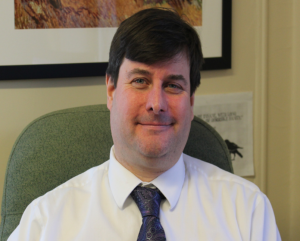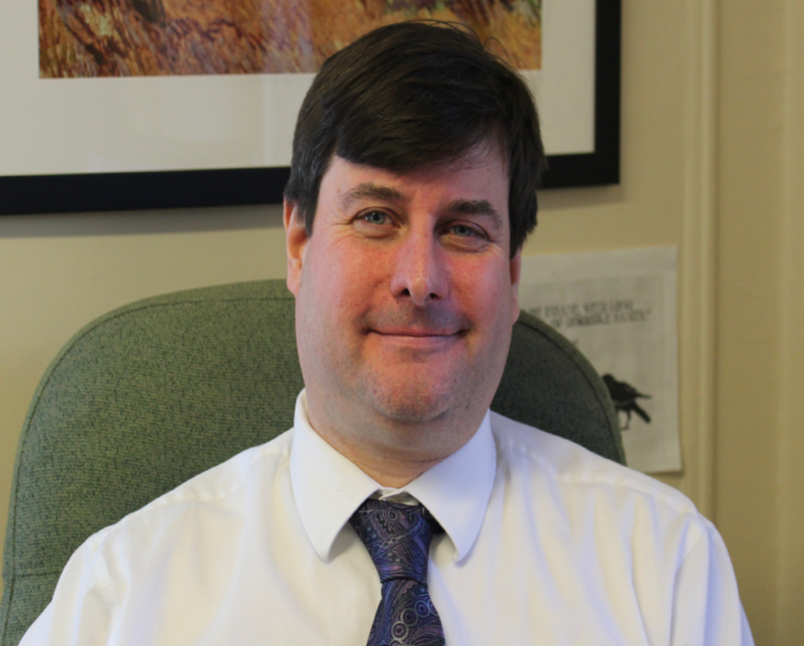By Jada Butler
News Editor
Dr. John Lutz, English department chairperson and professor, announced his resignation as chair and member of the Faculty Council on Thursday, April 5. Lutz has held this position since January 2017, when the former chair, Michele Dornisch, resigned. Lutz’s resignation is effective the end of April.

John Lutz, English department chairperson and professor
Lutz shared his reasons for leaving in an email to members of the Faculty Council. “I feel that I can no longer participate in the process of shared governance because I no longer believe that we have any real shared governance,” he wrote. “Although there may be well-meaning administrators, in my view, their effectiveness and ability to participate in shared governance is thoroughly and fatally compromised by the tyrannical leadership of our President.” Lutz has been a member of the Council for three years, serving as secretary, vice chair and now chair.
The role of the Faculty Council is to collaborate with the administration to advance student learning and the creation of knowledge through faculty research.
Jon Schneider, the university’s director of public relations, responded on behalf of University President Kimberly Cline. “The process of updating LIU’s core curriculum, as well as our strategic planning process, are both strong examples of shared governance at our University. We have also seen improved communication through the developmentof the Campus Leadership Committee, regular communications to the campus community, meetings with the Faculty Council, and the addition of Deans to senior leadership meetings.”
Schneider said Cline’s goal, like the goal of the Faculty Council, is to support students. “With programs like LIU Promise, our university is committed to supporting student success. I am pleased to say that graduation rates have dramatically improved over the past several years as a result of our collective efforts. Now that we have adopted best academic practices by moving to a 120-credit requirement, improving our core, and standardizing credit overload policies to match those already in place at peer universities, this will further contribute to student success by improving graduation rates.”
Lutz disagrees. “Decisions are being made without faculty. Shared governance is a farce,” he said.
A pivotal moment in this rift, according to Lutz, arose in Sept. 2016, when the LIU Brooklyn faculty was locked out before the start of classes after their union contracts expired. The Pioneer reported in a Sept. 14, 2016 article, “LIU Faculty Disruption to Begin Semester” that the Brooklyn faculty were denied access to the campus, had their emails blocked, and had their health insurance cancelled. The lockout, Lutz said, had a negative impact at Post as well.
The faculty had no confidence in Cline after the lockout. Lutz was listed as a contact for the faculty, although the faculty’s position was not his personal statement. Since then, Cline accused Lutz of libel four times. “I’ve taken that as an attempt to intimidate and silence me and the faculty – preventing us from exercising our constitutional rights,” Lutz said.
LIU’s Board of Trustees hired Cline as president in July 2013, and in November 2017 granted her a contract extension until 2023, despite the votes of no confidence by faculty at both the Brooklyn and Post campuses.
“I look back on the things we sent, the issues we have raised and I can’t point to a single thing that they [the administration] compromised on,” Lutz said, explaining what he called a lack of shared governance.The only instance of collaboration was the creation of the 120 core credit policy, which Lutz said had “nothing to do with the administration and everything to do with others being able to collaborate with me.”
Lutz said the faculty had “absolutely no involvement” in the new 18 credit policy, and many learned from their students.
“After three years, you would think there would be some give and take – that they would value the faculty’s perception of what is good. That doesn’t mean that there must always be an agreement – but don’t disagree on everything,” he said. “It’s Cline’s way or the highway.”
Lutz isn’t the only faculty member speaking out against the administration, according to Katherine Hill-Miller, English professor and former dean of the College of Liberal Arts and Sciences. “The narrative presented [by the administration] to the Board of Trustees is that the faculty are gripping and tearing the institution apart,” she said, but that is not the case. “All of us faculty members love our students. We have a great passion for the institution – we are very protective of it,” she said.
Hill-Miller is sorry to see Lutz leave the Faculty Council position. “He is such a voice of rationality and collaboration,” she said.
“I think the faculty owes [Lutz] a debt of gratitude. He did a very important service trying to deal with the administration for two years, which wasn’t easy,” Michael Soupios, political science professor, said.
Soupios thinks university administrators are rapidly reaching a point where they think they can do “more or less anything they want.”
“Dr. Cline’s mismanagement of human resources has paralyzed daily operations and reduced morale to an all-time low. I’ve worked unsuccessfully toward shared governance for three years. I’m a graduate of LIU Post. The direction of my life was fundamentally changed by the dedication and intellectual vision of faculty here. I’m not speaking out publicly to harm the university, but out of love for it: love for Post, love for my colleagues, love for learning, but, most of all, love for my students. President Cline’s greatest failure of leadership has been her inability to nurture these forms of love in faculty. Instead, she has persuaded most of us that her goals are inimical to our most cherished beliefs and values,” Lutz said.
Mark Pires, Faculty Council vice chairperson, is also saddened by Lutz’s decision, but believes it is understandable given the many challenges currently facing the university. “Dr. Lutz has served the LIU Post Faculty Council and the students of this campus with distinction and integrity for many years. He is a respected colleague and a tireless advocate for high quality academic programming,” Pires said.
“We faculty have dedicated our careers to the university, while administration has cycled through a rotating cast of characters. We have a vested interest in seeing the university thrive, and hoped our ideas and concerns could be heard as the university moves forward. Unfortunately, it has become increasingly apparent that the administration is not interested in hearing from faculty,” Heather Parrott, a sociology professor, said.
Several members on the Faculty Council will finish their terms at the end of this year and there have been two calls for nominations, yet Lutz said that no one has volunteered. “I have never seen faculty so demoralized – never seen so many people disengaged. People think their voice doesn’t matter. They don’t see – as I don’t see – an [administrative] effort to make change,” he said.
Lutz believes there are many good administrators, all of whom he admires and has good relationships with, but they are in a difficult position. “The perception of faculty is that those professionals [the administration] are over burdened,” Lutz said.
“I don’t resign without a real sense of sadness,” he said. The level of stress and lack of peace of mind, worrying about LIU and the frustration of not being able to move forward, has impacted Lutz personally. “I’ve done my service, now I will focus on my family and my scholarship,” he said. Lutz will continue teaching and remain chair of the English department.
Lutz referenced the play “Death of a Salesman” by Arthur Miller, comparing himself to the protagonist Willy Loman. “Willy is so attached to his dreams and his vision that he destroys himself and his family – his dream was not consistent with reality. I, like Willy, spent three years within the faculty council with a dream, with false hope.” Like Biff, Willy’s son, said in the play, “Sometimes a man has to walk away.”







Be First to Comment